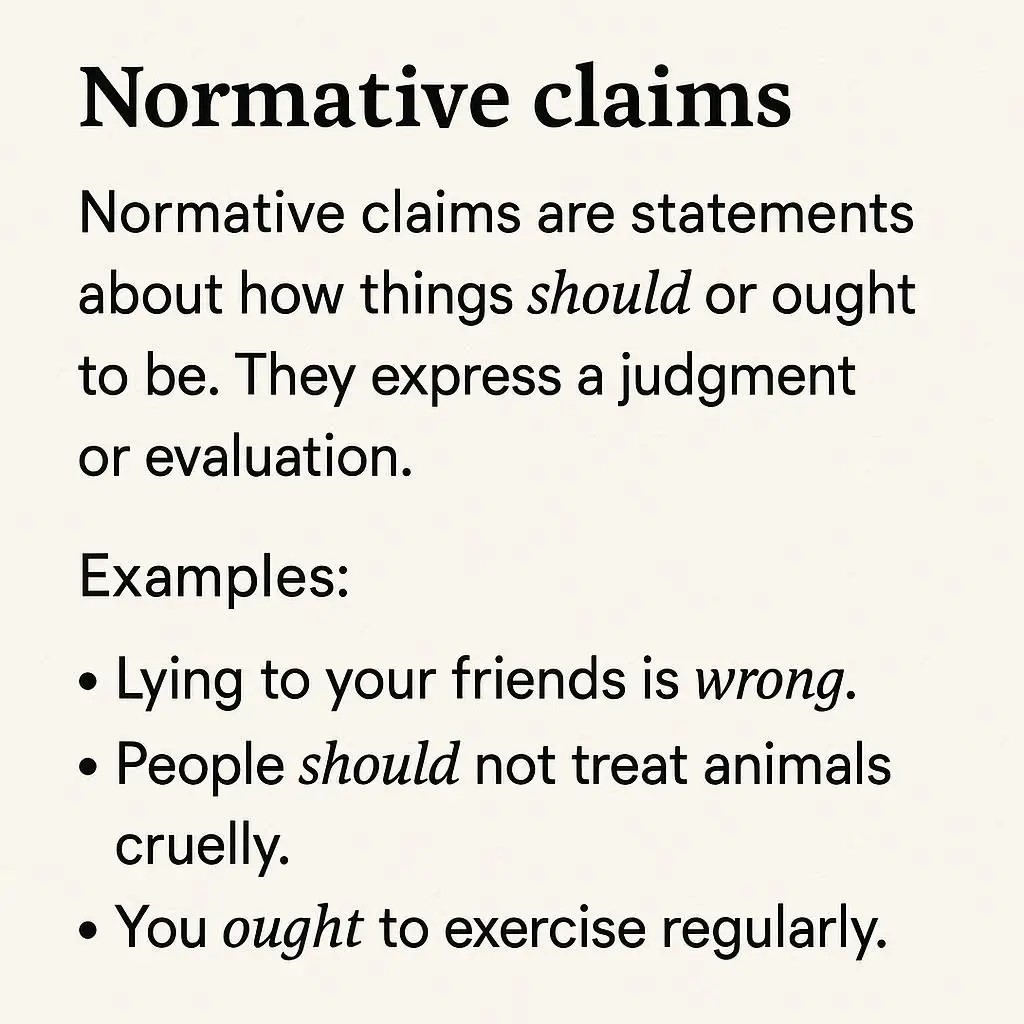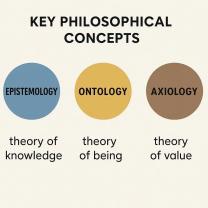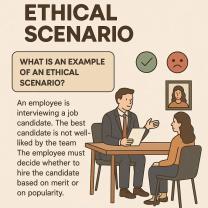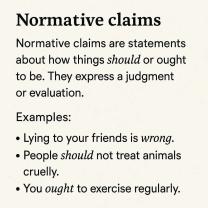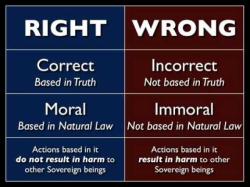What is normative claims?
Normative, Descriptive, and Evaluative Claims: Definitions and Examples
When we make statements about the world, we don’t always mean the same thing. Some statements describe facts, others express value judgments, and some prescribe how things ought to be. In philosophy, ethics, and critical thinking, these are often categorized as descriptive claims, evaluative claims, and normative claims. Understanding the differences helps us think more clearly and argue more effectively.
1. Descriptive Claims
A descriptive claim is a factual statement about how the world actually is. It can be tested, verified, or disproven with evidence.
Key Question: What is the case?
Examples:
“The Earth orbits the Sun.”
“Most people prefer coffee over tea.”
“Unemployment rose during the pandemic.”
These claims deal with reality as it exists, without attaching moral or value judgments.
2. Evaluative Claims
An evaluative claim expresses a judgment of value—something is good, bad, better, or worse. However, it doesn’t necessarily prescribe action or say what ought to be done.
Key Question: Is this good or bad?
Examples:
“Van Gogh was a brilliant painter.”
“This restaurant serves excellent food.”
“That movie was boring.”
Evaluative claims reveal preferences, judgments, or appraisals, but they don’t always tell us what we should do next.
3. Normative Claims
A normative claim goes one step further: it prescribes how things should be, based on values, norms, or ethical principles. These claims are common in moral debates, politics, and social discussions.
Key Question: What ought to be the case?
Examples:
“Everyone should have equal access to education.”
“It is wrong to cheat on exams.”
“The government ought to provide free healthcare.”
Normative claims are not just about describing or evaluating—they guide behavior, policies, and moral choices.
Quick Comparison Table
| Type of Claim | Definition | Key Question | Example |
|---|---|---|---|
| Descriptive | States facts about the world as it is. | “What is the case?” | “The Earth orbits the Sun.” |
| Evaluative | Expresses a value judgment (good/bad). | “Is this good or bad?” | “Van Gogh was a brilliant painter.” |
| Normative | Prescribes what ought to be done. | “What should be the case?” | “Everyone should have equal access to education.” |
Conclusion
In summary:
Descriptive claims tell us about facts.
Evaluative claims tell us about values.
Normative claims tell us what should be done.
By distinguishing between these three, we can better analyze arguments, avoid confusion, and build stronger reasoning in both academic and everyday discussions.
Understanding Normative Claims
A normative claim is a statement about what ought to be or should be the case, as opposed to what simply is the case.
Difference Between Normative and Descriptive Statements
The distinction between normative and descriptive statements is a fundamental concept in philosophy, economics, and social sciences.
Descriptive Statements: These are objective and factual.
They describe how the world is. They can be proven or disproven with empirical evidence. Example: "The unemployment rate in the U.S. is 4%." (This is a factual claim that can be verified with data.)
Normative Statements: These are subjective and evaluative.
They describe how the world should be. They express a value judgment or a moral claim and cannot be proven or disproven by facts alone. Example: "The government should reduce the unemployment rate."
(This is a recommendation based on the value that a lower unemployment rate is desirable.)
Examples of Normative Claims in Economics and Ethics
Normative claims are prevalent in fields that deal with values and goals.
In Economics: Normative economics is concerned with what economic policies "ought" to be implemented.
"The minimum wage should be raised to ensure a living wage for all workers."
"Taxes on the wealthy ought to be increased to reduce income inequality."
"A free-market system is better for economic growth."
In Ethics: Normative ethics focuses on moral actions and principles.
"Slavery is wrong."
"People should be kind to one another."
"It is a person's moral duty to help those in need."
Normative claims are not limited to these fields. For instance, "That painting is beautiful" is an aesthetic normative claim.
How to Analyze Normative Arguments
Analyzing a normative argument requires more than just checking facts. It involves evaluating the underlying values and the logical structure of the argument.
Identify the Normative Claim: First, isolate the main conclusion of the argument, which is the "ought" or "should" statement. For example, "You should stop smoking."
Uncover the Normative Premises: An argument with a normative conclusion must have at least one normative premise. For example, "Anything that is bad for your health should be stopped."
Evaluate the Premises: Analyze both the descriptive and normative premises. Are the descriptive premises factually correct? Is the normative premise sound? A common error is assuming a general normative principle is always true.
For instance, the premise "If something is bad for your health, then you should not do it" might not be true in all cases (e.g., firefighting). Examine the Logic: Check if the conclusion logically follows from the premises. A well-constructed normative argument will use sound reasoning (e.g., deductive or inductive logic) to connect the premises to the conclusion.
Consider Counterarguments: A robust analysis involves anticipating and responding to potential counterarguments.
This shows a deep understanding of the topic and the values at play.
Importance of Normative Claims in Decision Making
Normative claims are not just abstract philosophical ideas; they are essential for real-world decision-making.
Policy and Law: Policymakers rely on normative claims to guide the creation of laws and regulations. For example, the normative claim that a clean environment is a public good leads to policies on pollution control.
Ethical Frameworks: In business, healthcare, and everyday life, normative claims help establish ethical frameworks.
They guide decisions by asking "What is the right thing to do?" rather than just "What is the most profitable or easiest thing to do?" Personal Decisions: We use normative claims to guide our personal lives. Deciding whether to pursue a career, choose a course of action, or help a friend are all driven by underlying values and beliefs about what we "ought" to do.
Balancing Facts and Values: Effective decision-making often involves a balance between descriptive and normative analysis.
Descriptive data provides the factual basis, while normative judgments shape the goals and priorities. For instance, a government may use descriptive economic data (e.g., unemployment rates) to understand a problem, but its decision on how to act is ultimately a normative one based on its values.
